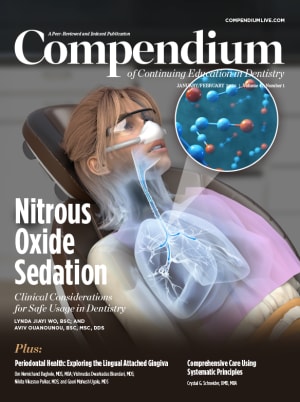Removing Obstacles to Oral Care for Patients With Special Needs
By the Special Care Dentistry Association
Approximately 56.7 million—or 19% of the population in the United States—have some type of disability affecting their daily lives, according to the US Census Bureau. For more than half of these people, or 38 million, their disability level is considered severe.1 Institutionalized and homebound elderly individuals for whom self-care may be especially difficult have poorer oral health than their more active elderly peers.2-4 As older adults age, they may experience difficulties brushing their teeth, which has been shown to be effective in preventing oral disease,5 and poor self-care correlates with a higher rate of dental caries.6 Those aged 75 years and older were more likely to have edentulism (32%) versus people aged 50 to 64 years (10%).3,7
Compared to the general population, individuals with disabilities or other special healthcare needs have more untreated caries, and those with intellectual disabilities are more likely to have a higher prevalence of periodontal disease. Further, they have more problems related to orofacial trauma, and children with intellectual disabilities are more prone to develop malocclusion. Two-thirds of residential facilities caring for these individuals report that inadequate access to dental care is a significant issue.8
Special-Care Dentistry
Special-care dentistry is the branch of dentistry providing oral-care services for people with physical, medical, developmental, or cognitive conditions that limit their ability to receive such care. The Special Care Dentistry Association (SCDA) believes the oral health of individuals with special needs has a direct effect on the overall health of that person and adequate oral care should be accessible to all patients with special needs.
The more complex the patient’s health is, the more likely interdisciplinary approaches will help improve the patient’s care. Such tactics must extend beyond medicine and dentistry to include fostering relationships with social, nutritional, behavioral, and services that support health attainment and maintenance. Practitioners caring for patients with special needs must have intensive knowledge of medically compromised conditions, the consequences of aging, mental-health conditions, social disabilities, and physical, sensory, and emotional impairments. Dental providers must perform overall patient health assessments and become comfortable making referrals for routine medical care or follow-ups on non-oral conditions.9
In the past 17 years, more attention has been focused on identifying issues in patients with special needs and oral care. In 2001, the US Health Resources and Services Administration sponsored the Conference on Dental Care Considerations of Disadvantaged and Special Care Populations, which concluded that patients with special needs would benefit from an increased number of trained dental professionals available; improving the integration between systems delivering medical and oral healthcare, including joint oral health training of medical, dental, and nursing health providers; and expanding dental residency programs that provide training in the care of these persons.10
Also in that same year, a report, Closing the Gap, by the US Surgeon General, acknowledged the difficulties in accessing quality dental care that patients with special needs and their families encounter. A key recommendation was related to the need to improve training.11
Nine years later in 2010, the Committee on Oral Health Access to Services of the Institute of Medicine and the National Research Council concluded that patients with disabilities in need of oral care confront problems such as transportation barriers (especially for those with physical disabilities) and costs. In addition, many dental offices cannot physically accommodate them.12
Training in Dental Schools
From 1993 to 1999, the average number of dental schools’ curriculum hours devoted to the care of patients with special needs decreased from 12.9 hours to 5 hours.13,14 A 2003 review by the American Academy of Developmental Medicine and Dentistry reported only 7 in 56 dental schools “have substantial programs in special-needs dentistry.”15
Disincentives for dental schools to provide such training include: state support for public dental schools has decreased markedly, Medicaid reimbursement for oral healthcare of disabled adults is virtually nonexistent, graduate medical education funding for schools has been eliminated, and fewer faculty members are qualified to teach this care category.16
In 2013, the Commission on Dental Accreditation (CODA) created a standard relating to training in the care of patients with special needs. However, the newly enacted standard addresses the need for training provided by dental schools in the management of patients with special needs. The standard does not require training dental students in providing care for these individuals.
SCDA salutes the provision of training in the care of patients with special needs as it occurs in many postdoctoral programs. However, the comprehensive and intensive care of patients with special needs requires substantial training time and clinical experiences that existing programs alone may not be able to provide. Recognition of a new category of postdoctoral training (special-care dentistry) and the creation of educational standards would ensure a well-trained cadre of dental providers will be available to treat pediatric and adult patients with special needs.
